- Home
- Donald Hamilton
Texas Fever Page 8
Texas Fever Read online
Page 8
“Isn’t anybody going to offer a lady a drink?” she asked quickly, before Keller could speak.
Paine, tall and thin in his black clothes, came forward to splash some whiskey into a glass for her, taking the opportunity to replenish his own drink at the same time. She swallowed deeply, feeling the stuff go down like fire, and caught a glimpse of herself in the mirror above the dresser, in her fine blue silk dress, with a small hat on her smoothly disciplined hair, demure and lady-like except for the glass in her hand.
She had a moment of wanting to laugh, thinking of the expressions of the obsequious storekeepers with whom she’d dealt this afternoon, and of the prim town ladies with whom she’d passed the time of day, could they see her now, drinking straight whiskey like a man. She drained the glass abruptly, and set it aside. There was a considerable temptation to have another drink, but experience had taught her that one was the right quantity.
It drew a veil over harsh realities, making them bearable, without rendering her stupid or reckless.
“Well,” she said, “what have you gentlemen been debating in my absence?”
Keller asked, “What’s all that?” gesturing towards the packages.
“Clothes,” she said. “The selection wasn’t really overwhelming. The local ladies must wear flour-sacks next to the skin.”
“Is that a new dress?”
“Yes,” she said. “Don’t you remember, I ordered it when we first came here? Today, I went for a fitting, and the seamstress had it ready, so I—”
“Haven’t you done anything besides buy pretties for yourself?” he asked harshly. “I sent you out to—”
She said angrily, “I know what you sent me for, honey. Was I supposed to go up to the sheriff and ask questions? Did you want me to say: the outlaw Jack Keller and his right-hand man Preacher Paine are at the Kansas Union Hotel and they’d be obliged if you’d tell me—”
“Shut up!” he said. “These walls aren’t soundproof.”
“I declare, it doesn’t seem to bother you when you want to shout!” She drew a long breath, and said quickly: “I talked to the shopkeepers, and to some women who were disposed to be friendly and condescending towards a young bride traveling in a strange country, and to the seamstress. . . . It’s all over town. McAuliffe’s dead, the old man. The men are in jail. The boy’s lying in the sheriff’s house with a cracked head.” For a woman who prided herself on having dispensed with the luxury of a conscience, she found it strangely difficult to maintain the proper, callous tone of voice. “What else did you want to know?”
Paine was looking at himself in the mirror, touching his scraped cheek with his fingertips. “Did anybody know what those crazy Texans were trying to accomplish with their insane maneuver? Why, they might have killed somebody!”
“That,” she said, “is probably just what they were after, friend.” She glanced at Keller. “I told you not to show yourself there, remember? The Preacher could have dealt with them alone. I warned you something might happen if they recognized you. I told you—”
“Shut up,” he said. “Does anybody know?”
“That you’re the man they were after? Nobody seems to.”
“That means the hired hands are keeping their mouths shut. What about the boy? Is he fit to talk yet?”
She nodded. “The sheriff seems to’ve had quite a conversation with him. The way I heard it repeated, he says his daddy just went quietly mad at having his cattle turned back again—I gathered it was the third or fourth time it had happened. The rest, not being very fond of Yankees anyway, just went along for the ride.”
“That’s all?”
“There was no mention of you, by the name of Netherton or any other. Well, there wouldn’t be. I haven’t had a lot of experience with Texans, but I know my southerners, honey. It would be a personal matter with them. They wouldn’t want the law to have you, even if they trusted the Yankee law to act, which they undoubtedly don’t. They’ll be hoping to settle with you themselves, some day.”
“They’re welcome to try,” Keller said sourly. “Well, it was your idea to come here. What does the clever Miss Netherton think we should do now?”
She said, “Don’t blame me because you went and spoiled everything by showing your face! They came here, didn’t they, as I said they would after I’d dropped the name of the town into the boy’s ear? If you’d just stayed out of sight and let the Preacher handle it, we’d have had that herd for three or four dollars a head; and with our tame deputy to help us, we’d have been collecting four or five hundred percent profit within a couple of weeks. That was what I advised from the start, remember, when I heard you had the law in your pocket around here—”
The Preacher said quickly, “Not the whole law, by any means. That sheriff is an old prairie wolf; don’t underestimate him.”
Amanda said, “He could have been decoyed away at the right moment. . . . But you wouldn’t listen!” she said angrily to Keller. “You didn’t want to put. out any money; you were going to get those cattle for nothing; but all you got was a bullet in the leg! I told you times are changing along this border. Some people are going to play it carefully and legally—well, semi-legally, at least—and get rich; and others are going to stick to their old violent ways and get hung. I tell you—”
Keller said, “You tell me too damn much, girl!” There was a little silence, and she saw that she’d gone too far. It amused him, sometimes, to let her prattle on; and sometimes he even accepted her advice and used her ideas; but there was a line and she’d overstepped it.
“Well,” she said sulkily, “I want what’s best for us, you know that, and I don’t like to see an opportunity wasted.”
He said, “Nothing’s wasted, and nothing’s spoiled. In fact, things couldn’t have turned out better.”
“What do you mean?”
“What’s happened to those cattle? You didn’t bother to mention that.”
“Why, they’ve been impounded by the sheriff.”
“And what about the boy and the men in jail?”
“They’ll go before the judge in the morning. Everyone expects him to levy a heavy fine, at the very least . . . Oh,” she said. “I see.”
“Just so,” he said. “We’ll get that herd yet, and cheaper than the Preacher could have bought it off that stubborn old fool.” He swung his legs to the floor, pulled on his boots, rose, and came to her. He looked down at her critically, and took a fold of the new silk dress between his fingers. “Very genteel and lady-like,” he said with a sneer in his voice. “I expect the town ladies were quite impressed. Well, don’t let it give you big ideas, Mandy girl. You aren’t running this outfit, and you’re not a lady. Not any more, my dear. You’re not even an officer’s mistress. You’re just Jack Keller’s woman. Understand?” After a moment, he said, “One more thing. That deputy. He’s losing his nerve. He didn’t bargain for killing, and he’s afraid of the sheriff. He wants to back out. He’ll be coming here as soon as it’s dark enough he won’t be seen; the Preacher referred him to me. But I won’t be here, and neither will the Preacher. You will.”
She looked up into his bearded face, and read nothing there, but she realized that she was being punished for talking too much and too disrespectfully. There were other ways in which Deputy Sheriff Reese could have been induced to cooperate, but Keller had chosen this one deliberately.
“I see,” she murmured.
Keller nodded. “You’ll persuade our friend to play along with us. How you do it is your business.”
“Is it?” she asked. “I thought . . . I thought you said if you ever caught me with another man, you’d kill him and break me in two.”
Jack Keller walked to the door, and looked back. He could have been smiling wolfishly. The beard made it hard to tell. “Ah,” he said, “but I don’t intend to catch you, tonight. Come on, Preacher. . . .”
The door closed behind them. She stood alone in the room and did not move for a long time. Already the light was fading fr
om the windows. She considered refusing the chore that had been assigned her, or doing it badly, and knew she wouldn’t. It didn’t make that much difference any more. She shivered abruptly, and went to the dresser, and poured herself a small amount of whiskey and drank it down.
Presently she lit the lamp, removed her hat, took off her dress, and replaced it with a frilly, semi-transparent, trailing garment that she’d bought some years back when a colonel in the Union Army had been paying for her clothes. He was the man to whom she’d gone—the first —selecting him deliberately from a number of possibilities, when things had got too bad that winter towards the end of the war, with no food or wood for the fire and the town occupied by Yankee troops. He’d been a man who liked flounces and ruffles; an elderly man who’d treated her like a daughter, except at night. . . .
There was a knock at the door. She gave herself a quick glance in the mirror, patted her hair, and fluffed the pink ruffles at her breasts—they were a little limp and not entirely clean after the miles they’d traveled in her valise across dusty roads, but so much the better. She had made her judgment of Will Reese some time ago. For all his swaggering air, he was a man who might well lose his nerve in the presence of an immaculate and self-possessed lady; but she was sure he’d be quick to take advantage of a semi-intoxicated female in tarnished finery. She poured herself a little more whiskey, just enough for recklessness now, went to the door with the glass in her hand, and pulled it open.
He made a big shape in the doorway. Well, she thought wryly, at least this one's got a face. As a matter of fact, he wasn’t bad to look at, if you liked arrogant young men with big pistols at their hips. She found herself remembering a somewhat smaller youth, also with a pistol but without the arrogance. It wasn’t, for some reason, a happy memory, and she put it aside.
“Why, it’s Mr. Reese!” she said. “I’m real sorry, Jack’s just stepped out. Perhaps you’d care to come in and have a drink while you wait. . .
CHAPTER 14
Judge Thomson was a plump, elderly little man with silky white hair, mustache, and sideburns that should have given him an air of gentle benevolence, but couldn't quite overcome the effect of his red, impatient face and sharp blue eyes.
“Five hundred dollars,” he said. “Is the defendant prepared to pay the fine now?”
“No, sir,” Chuck said.
“You have until tomorrow morning to produce the money,” Judge Thomson said. “If you are unable to do so, the sheriff is directed to dispose of the impounded cattle as the law provides, to satisfy the judgment of the court. . . . Mr. McAuliffe.”
“Yes, sir.”
“In letting you and your men go free, this court is taking cognizance of the personal loss you have suffered. It is hoped that you have learned the lesson that the laws of the State of Kansas are not to be taken lightly. But you are hereby warned that any further acts of violence within our jurisdiction will not be treated with equal lenience. Court is adjourned.”
Outside the frame building, that also housed the sheriff’s office and jail, Chuck paused in the hot morning sunshine to look around. The two short, wide, dusty streets of the town met here in a small square that boasted a few trees and a new equestrian statue erected to the memory of some Union officer of local renown. There seemed to be a hotel across the way.
There were a number of people in the square, farmers and townspeople both. They regarded the little group of Texans on the courthouse steps—in their boots and spurs and big hats—with a kind of wary curiosity, not actively hostile at the moment, but certainly not friendly. It occurred to Chuck that he’d felt considerably more at home the times he’d crossed the border into Mexico, although Mexico was technically a foreign land.
Beside him, Joe Paris drew a long breath. “Well, I’ve spent more time in worse jails, but that fresh air smells pretty good.” The middle-aged rider’s satisfaction faded before another thought: “Five hundred dollars! Just because a few mangy steers took it in their heads to run up a hill! Where the hell does that old buzzard expect us to scrape up that much cash in less than twenty-four hours?”
His loud voice drew resentful looks from the nearby citizens. Chuck said, “Take it easy, amigo. Don’t work yourself into a lather. Let’s at least get the Old Man decently buried before we pick another fight around here. I made the arrangements before coming to court—”
"Señor Carlos!”
Chuck looked around quickly. Miguel Apodaca jerked his head in the direction of two figures coming across the square. The girl, in a simple, long-sleeved calico dress, was tall and leggy and had blond hair. The man was also tall and blond. The silver badge on his shirt gleamed in the sunshine.
Joe Paris said in a strangled voice, “If I had my gun back—”
Chuck said, “The man’s an officer of the law here. If we lay a finger on him, we hang.”
Joe looked at him, shocked. “Kid, you mean you’re going to do nothing about the fellow who murdered your dad?”
Chuck glanced at the two approaching figures. Last night he, too, had been hot with anger—but the anger had betrayed him into the shameful error of running down another man, behind his back, to his promised bride. The truth or falsity of the charges didn’t matter; you just didn’t go around telling a girl that her man was a coward and a murderer, even if he was. The mistake into which he’d been led by his temper had cooled Chuck’s rage considerably. He’d seen the judgment in
Jean Kincaid’s eyes: just another Texas roughneck, careless of whom he hurt with his cattle, his pistol, or his big mouth.
Not that he cared much what a Yankee girl thought of him, but this was clearly no place to be making hasty mistakes of any kind. The vengeful temper of the men, when he joined them in court this morning, had completed the cure. It seemed a little unnatural for him, the youngest of the bunch, to have to play the careful, peaceful role that should have belonged to an older man; but after all, he was the owner now, and somebody had to keep a clear head if they weren’t to lose all chance of recovering the herd—not to mention the possibility of rotting in a Yankee jail or swinging at the end of a Yankee rope.
It wasn’t as if he was forgiving or forgetting anything, but there were better ways of killing a cat than chasing it around the yard with a dull axe.
He said, watching the big deputy approach, “You didn’t listen close to what I said, Joe. I said, he’s an officer of the law here”
Joe looked at him quickly. “You mean—”
“I mean,” Chuck said softly, “somewhere else, like down in Indian Territory, he’s just a fellow with a piece of tin on his chest. . . . Come on, the minister’s waiting.”
He strode off, and the men followed. They all passed within twenty feet of Will Reese and Jean Kincaid. The deputy made some remark to the girl as they went by, and laughed. She didn’t laugh, but she looked directly at Chuck McAuliffe and put her hand trustingly on Reese’s arm, walking close to the big man, as if to demonstrate that she was giving no weight at all to Chuck’s wild accusations of the night before.
The graveyard was slightly up the hill from the little white-painted church at the edge of town. It looked like a small and tidy place for small and tidy people, Chuck found himself thinking, as he listened to the minister’s voice declaiming the words of the funeral service with a dramatic fervor that deserved a greater audience than the little group of roughly-clad, bareheaded men standing by the open grave. It seemed like a tame spot for the Old Man to end up, after the places he’d been and the things he’d done.
Chuck became aware of a tightness in his throat and a wetness in his eyes. He turned slightly to hide his weakness from the other men. Then the preacher’s words came to an end, and he turned back to help finish the job. He was getting real handy with a shovel, he reflected grimly. The eight hundred miles from Texas had been paid for with human lives. Anybody who thought he’d let those lives go for nothing, just because an old gent with sidewhiskers spoke a few words in a courtroom, just wasn’t thinking
very straight.
Joe Paris straightened up and blew his nose loudly. “Thirty-five years,” he said in a gentle voice. “Since before you was born, kid. We covered a lot of miles together, the Major and me.”
“I know, Joe.”
They were all around him now, saying one thing and another they thought he’d like to hear; but he wasn’t making out the words too well. Always, when someone close to you died, you remembered the things left undone and unsaid, now that it was too late. . . . He swung blindly away and started walking towards the neat, white cemetery gate.
“There’s one more thing we have to do for him,” Joe Paris said, walking alongside. “How do you figure on getting this deputy down into the Territory, kid?”
Chuck said, “I figure he’ll go of his own accord, more or less.”
“How’s that?”
Chuck glanced at the older man. When he spoke, his voice was bitter: “We’ve got no more chance of raising that fine than of waving our arms and flying to the moon. We’re not supposed to have. These Yankees are all in cahoots, the way I see it. They’ve got their hands on our cattle, and they’re not about to let go in a hurry. If we’d had five hundred dollars among us, the judge would have made it a thousand. I’ll bet you the bank’s got its order, and anybody else with money in town. No Texan’s going to raise a cent in Jepson today, not if he’s got solid gold bars for security.”
“You could be putting it a mite strongly,” Joe said, seeming a little disturbed by Chuck’s vehemence. “I fought the Yankees for four years. It didn’t make me fond of them, by a long shot; but I don’t figure they’ve all got hoofs, horns, and tails, either; or that their favorite pastime is eating little Texas children. . . . Anyway, what’s this got to do with that murdering deputy?”
Chuck said, “I’ll try to raise the money this afternoon, sure. They’ll expect me to, and I wouldn’t want to disappoint them. I won’t get it. That means the cattle will be put up for auction. But the fellow who buys them is going to have to move them out of the state; it would look a little too raw if they let him ignore the quarantine completely. And there’ll likely be an officer of the law along to see him across the line, and maybe to protect him from us wicked Texans. I’m guessing the officer will be Reese. He seems to be taking a personal interest in our herd, and the sheriff’s not going to waste time on a little chore like that, not when he’s got a deputy to do the riding for him. And when Reese has finished the job, he’ll likely be coming back towards Jepson alone.” Chuck paused. “It’ll be like shooting a duck on a millpond.”

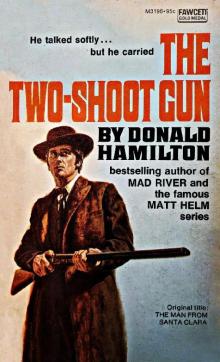 The Two-Shoot Gun
The Two-Shoot Gun Mad River
Mad River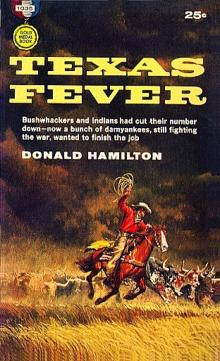 Texas Fever
Texas Fever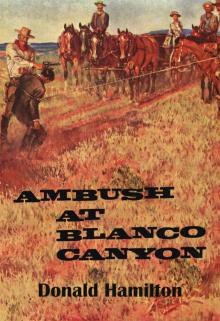 Ambush at Blanco Canyon
Ambush at Blanco Canyon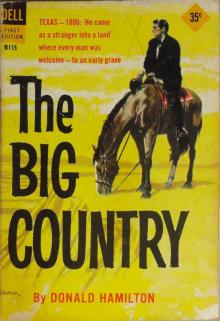 The Big Country
The Big Country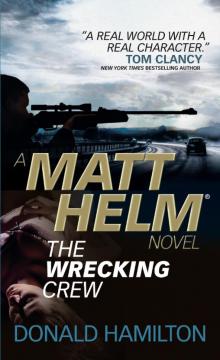 The Wrecking Crew
The Wrecking Crew The Devastators mh-9
The Devastators mh-9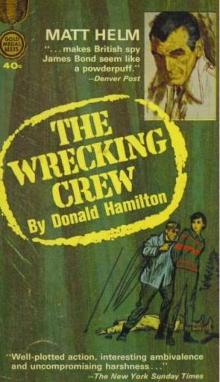 The Wrecking Crew mh-2
The Wrecking Crew mh-2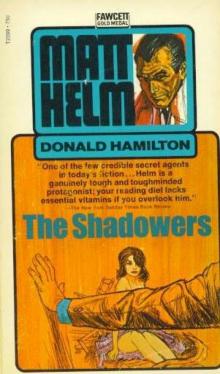 The Shadowers mh-7
The Shadowers mh-7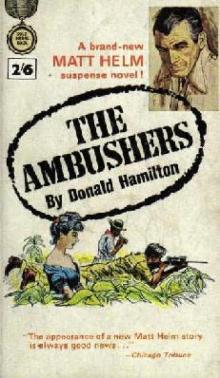 The Ambushers mh-6
The Ambushers mh-6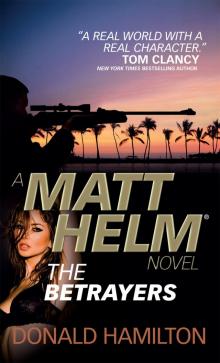 The Betrayers
The Betrayers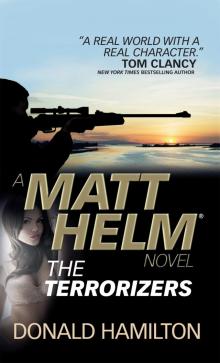 The Terrorizers
The Terrorizers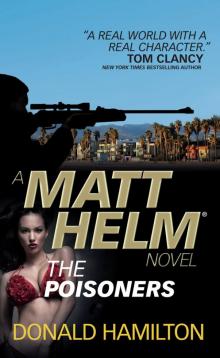 The Poisoners
The Poisoners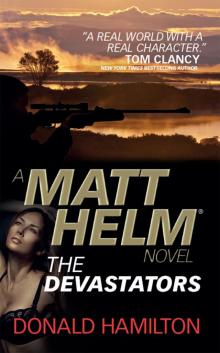 The Devastators
The Devastators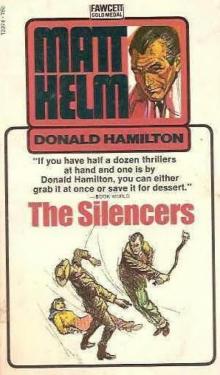 The Silencers mh-5
The Silencers mh-5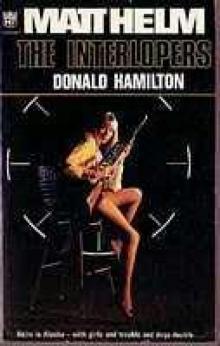 The Interlopers mh-12
The Interlopers mh-12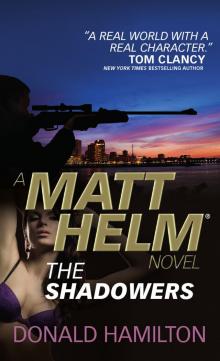 The Shadowers
The Shadowers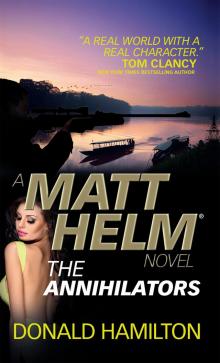 The Annihilators
The Annihilators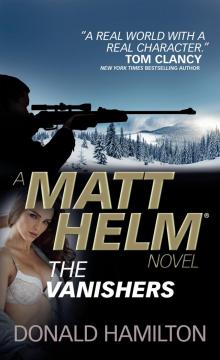 The Vanishers
The Vanishers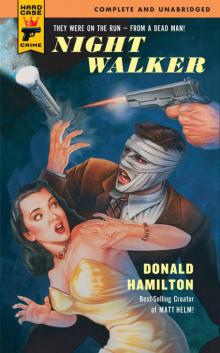 Night Walker
Night Walker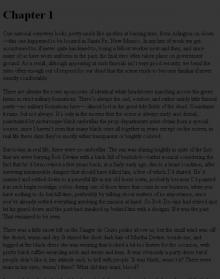 The Revengers
The Revengers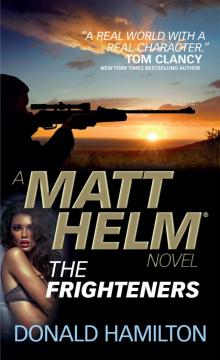 The Frighteners
The Frighteners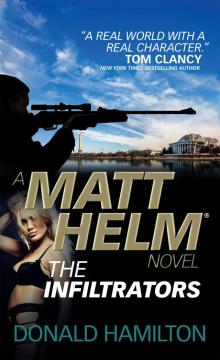 The Infiltrators
The Infiltrators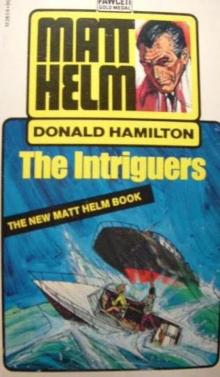 The Intriguers mh-14
The Intriguers mh-14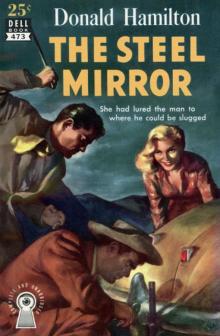 The Steel Mirror
The Steel Mirror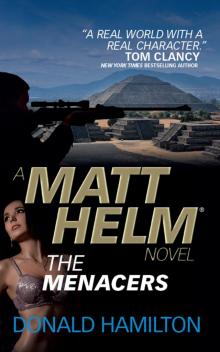 The Menacers
The Menacers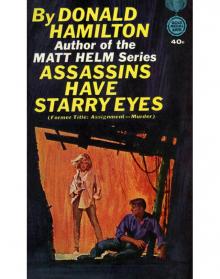 Assassins Have Starry Eyes
Assassins Have Starry Eyes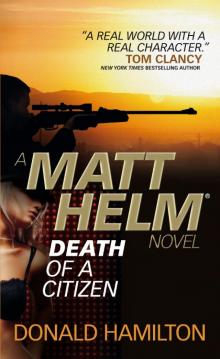 Death of a Citizen
Death of a Citizen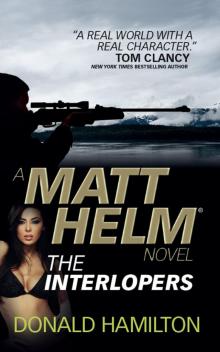 Matt Helm--The Interlopers
Matt Helm--The Interlopers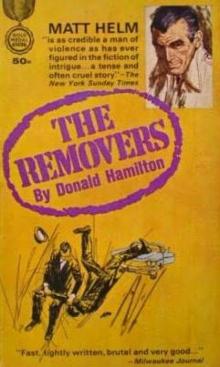 The Removers mh-3
The Removers mh-3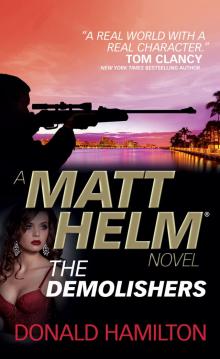 The Demolishers
The Demolishers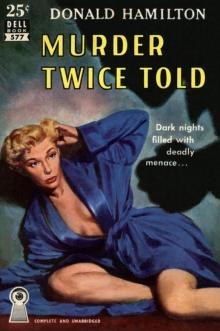 Murder Twice Told
Murder Twice Told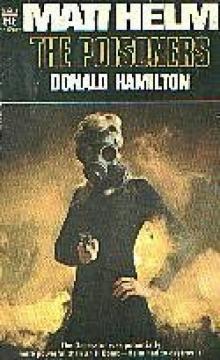 The Poisoners mh-13
The Poisoners mh-13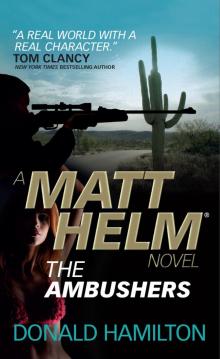 The Ambushers
The Ambushers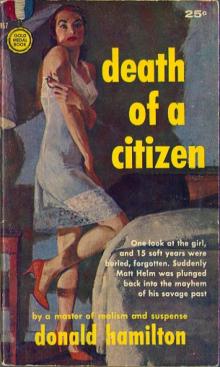 Death of a Citizen mh-1
Death of a Citizen mh-1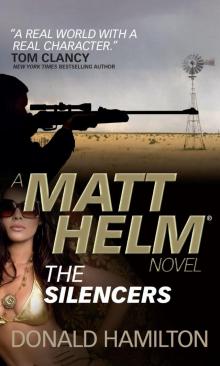 The Silencers
The Silencers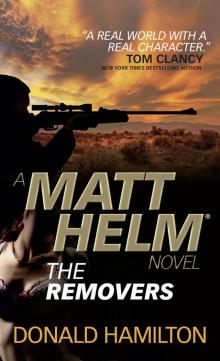 The Removers
The Removers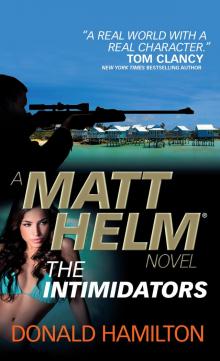 The Intimidators
The Intimidators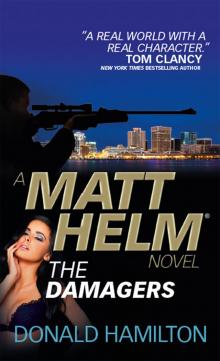 The Damagers
The Damagers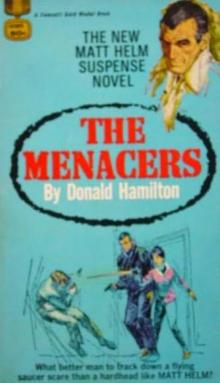 The Menacers mh-11
The Menacers mh-11 The Retaliators
The Retaliators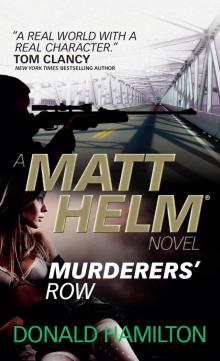 Murderers' Row
Murderers' Row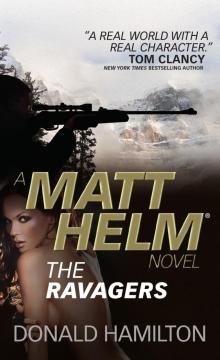 The Ravagers
The Ravagers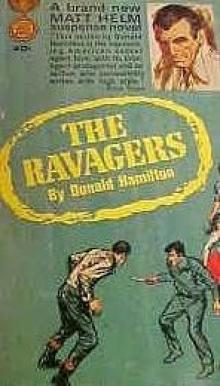 The Ravagers mh-8
The Ravagers mh-8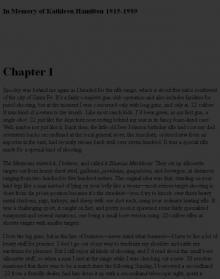 The Threateners
The Threateners The Betrayers mh-10
The Betrayers mh-10